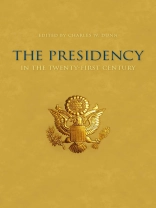As the most prominent figure of the U.S. government, the president is under constant scrutiny from both his colleagues and the American people. Questions about the proper role of the president have been especially prevalent in the media during the current economic crisis. The Presidency in the Twenty-first Century explores the growth of presidential power, investigating its social, political, and economic impact on America’s present and future. Editor Charles W. Dunn and a team of the nation’s leading political scientists examine a variety of topics, from the link between campaigning and governing to trends in presidential communication with the public. The book discusses the role of the presidency in a government designed to require cooperation with Congress and how this relationship is further complicated by the expectations of the public. Several contributors take a closer look at the Obama administration in light of President George W. Bush’s emphasis on the unitary executive, a governing style that continues to be highly controversial. Dunn and his contributors provide readers with a thorough analysis of a rapidly changing political role, provoking important questions about the future of America’s political system.
O autorze
Charles W. Dunn is dean of the Robertson School of Government at Regent University. He has served in several political posts, including as a special assistant to the Minority Whip of the U.S. House of Representatives and chief of staff to a U.S. senator from New York. He is also the author of several books, including The Seven Laws of Presidential Leadership and The Future of Conservatism: Conflict and Consensus in the Post-Reagan Era.












